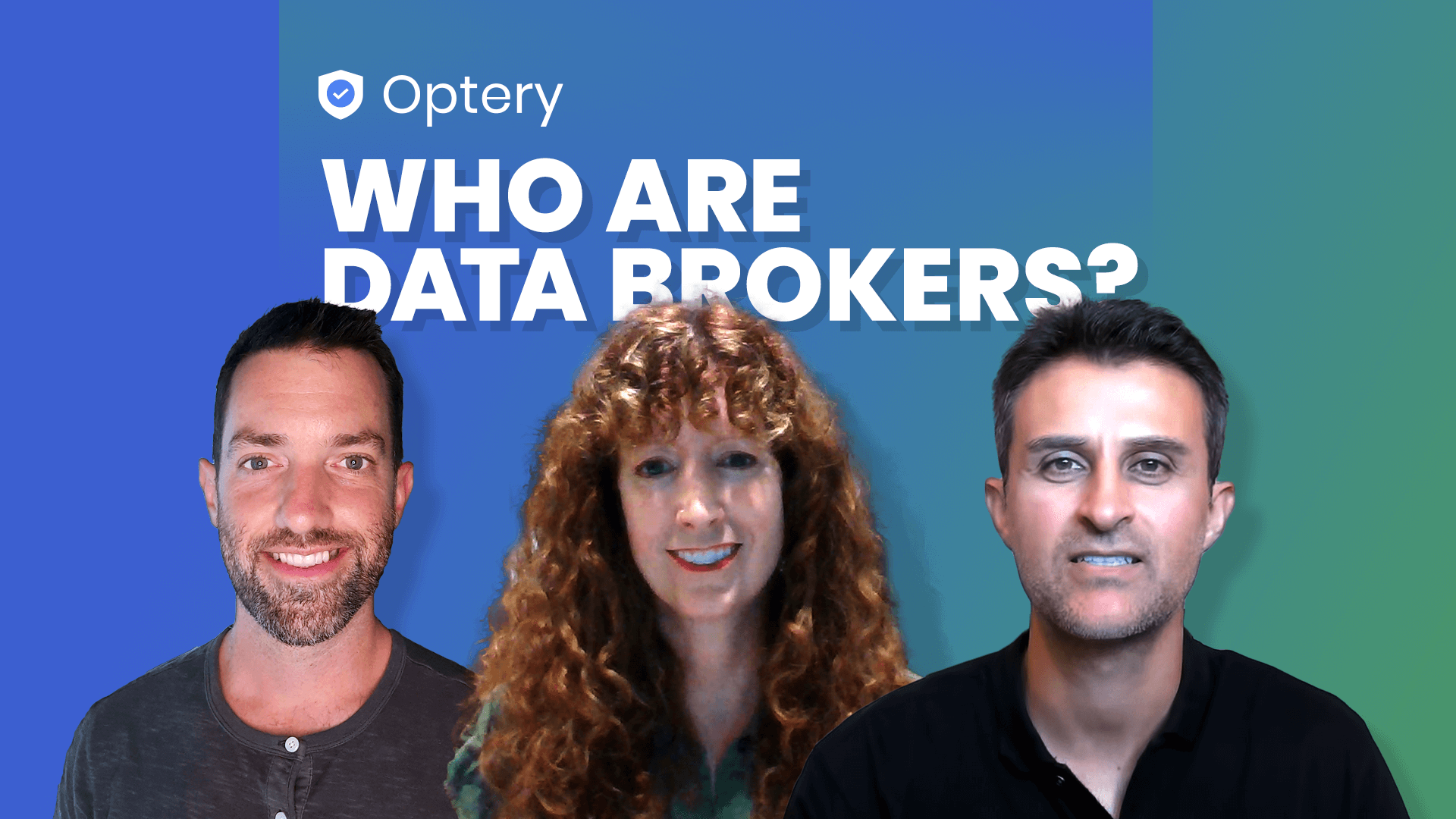Consumer Privacy and Data Brokers
This is a conversation about Data Brokers, People Search Sites, and trends in Consumer Privacy. This conversation includes Lawrence Gentilello, CEO and founder of Optery, and Heather Smith, Data Broker Operations Manager at Optery.
Data Brokers are companies that collect information on consumers and then sell that information to other companies. The Data Broker ecosystem is vast. Most of the Data Brokers, ordinary people, don’t know who they are or that they exist. The ones that peek their heads out of the shadows the most are Data Brokers that we call “People Search Sites”.
People Search Sites
The reason people are more familiar with those types of data brokers is because if they Google their own name, or the names of their friends or family members or acquaintances, those data brokers will post up information about people online on the web for anyone in the world to see.
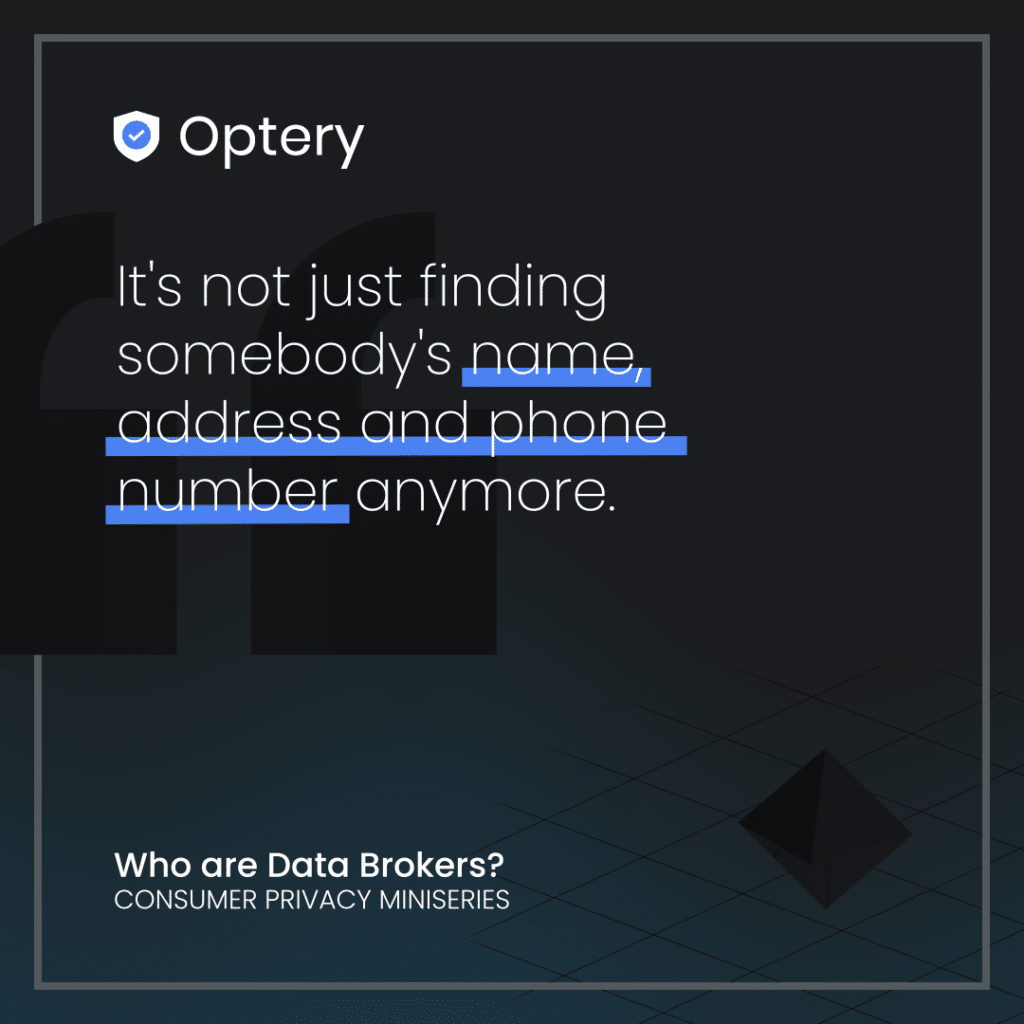
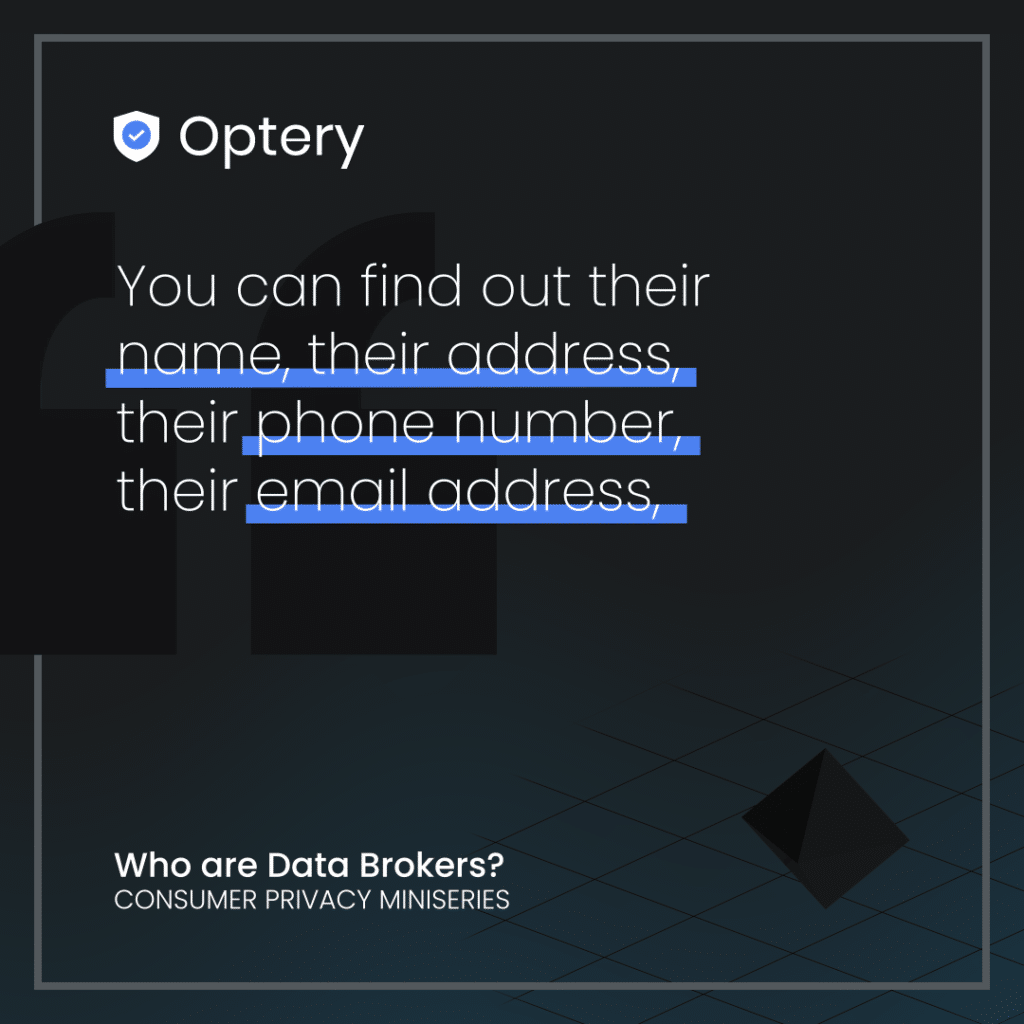
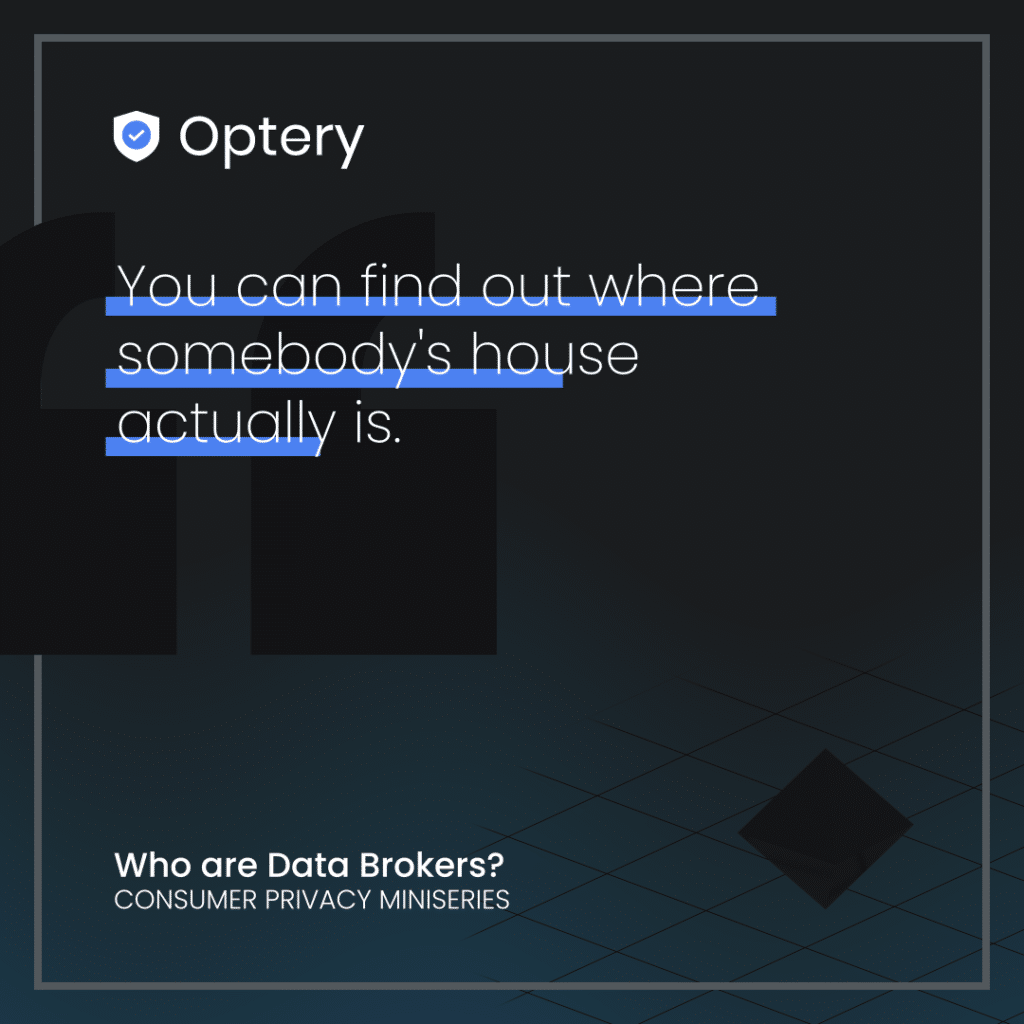
How to Find Sites that Sell your Information
Optery is a free consumer privacy tool that removes your home address, phone number, email, age, family members’ names and other private information from the People Search Sites. Optery prevents identity theft and fraud, reduces your surface area of attack for phishing attempts, hackers, and spam, and prevents people’s private information from showing up in Google search results.
Anyone can create a free account to receive a personalized Exposure Report summarizing where your information is openly posted and sold online. You can use your Exposure Report to double-check your own work opting out, or the work any competing services you might already be using. On average, we find 20 – 50 exposed profiles our competitors have missed. We cover over 200+ web sites and data brokers, more than any other personal information removal service on the market.
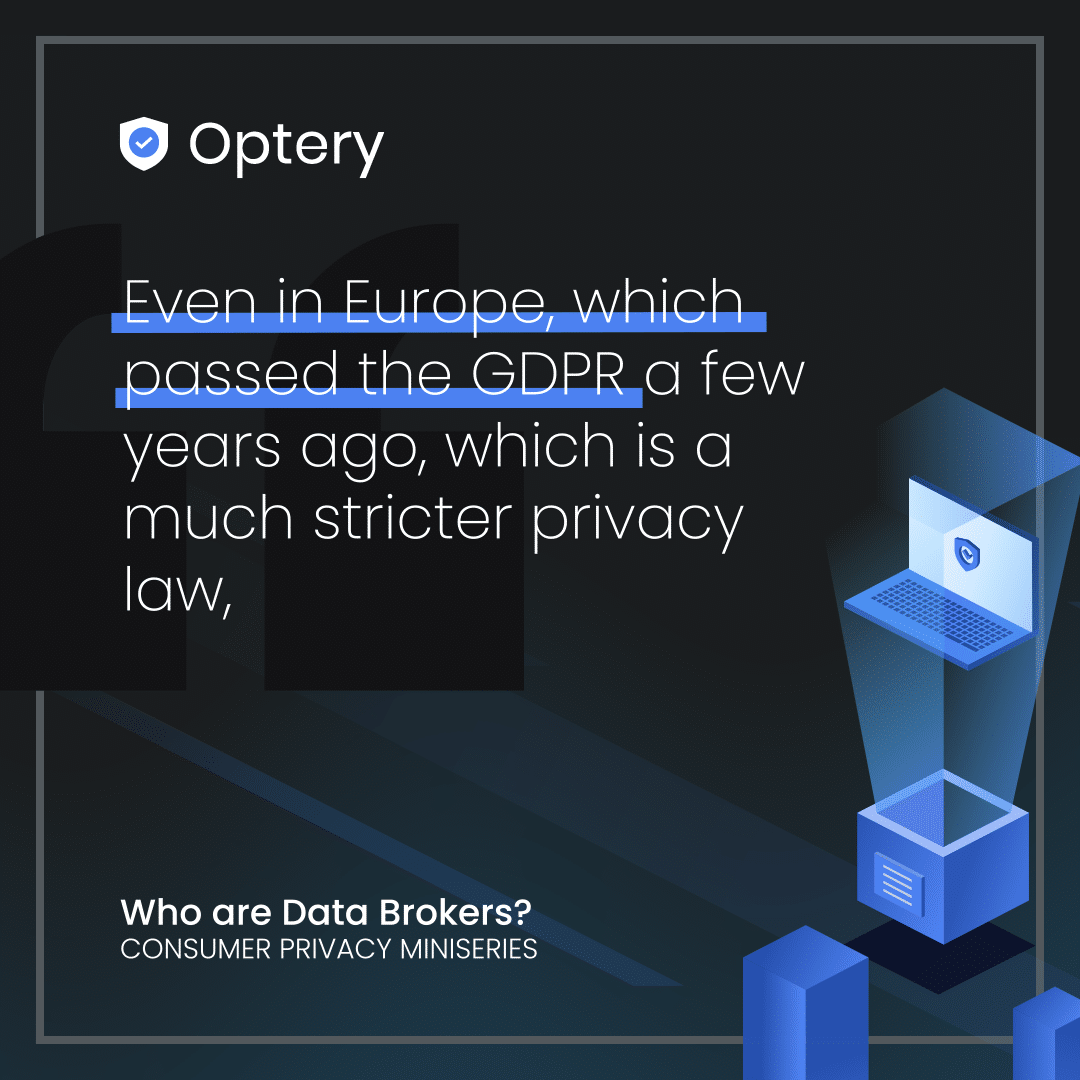
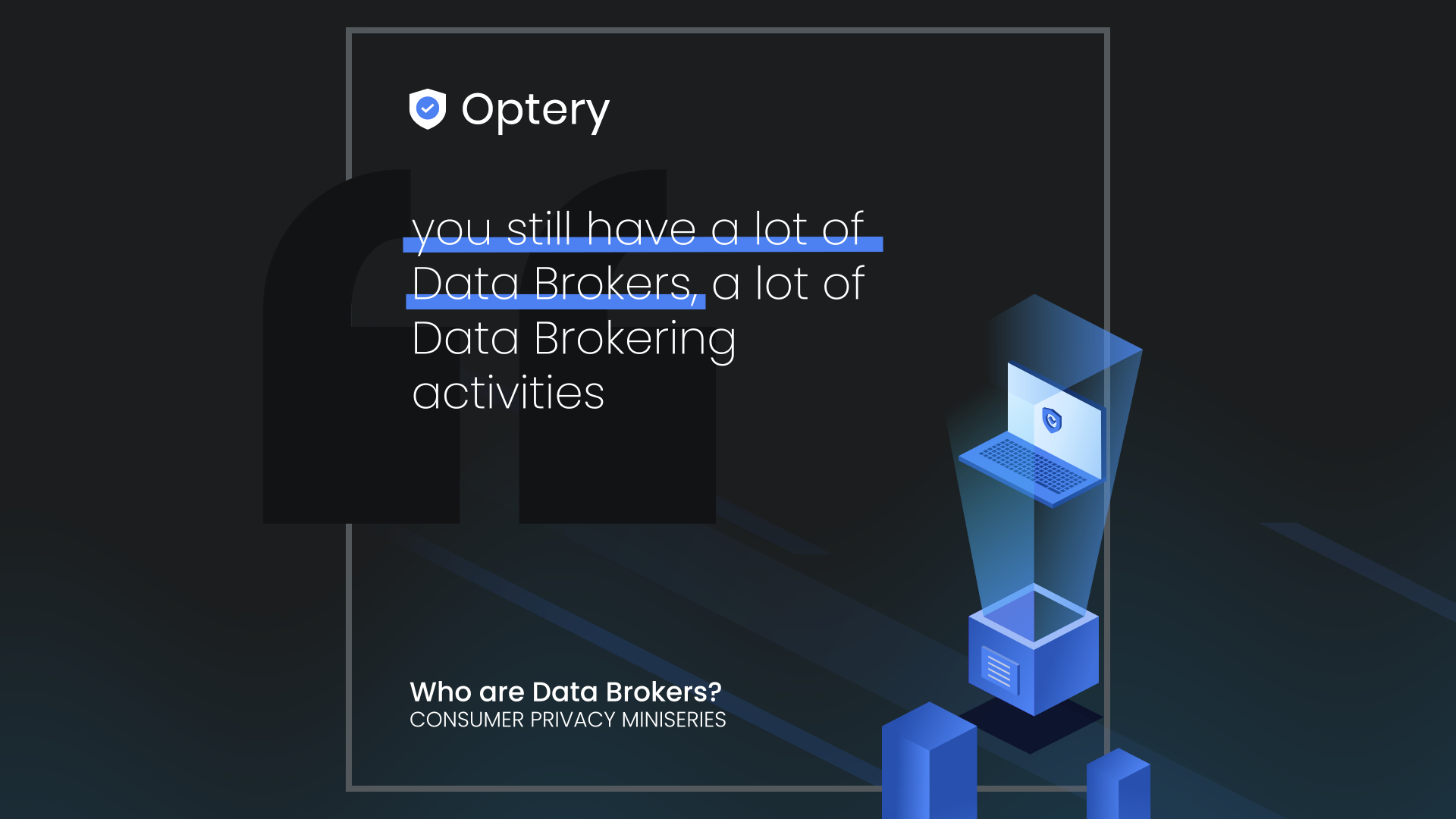
Transcript
| Speaker Name | Start Time | End Time | Transcript |
|---|---|---|---|
| Lawrence | 0:00:01:24 | 00:00:24:20 | Data Brokers are companies that collect and purchase information about consumers and then turn around and sell that information to other people or to companies. The Data Broker ecosystem is vast and there are a number of different categories of Data Brokers. But the Data Brokers we’re most focused on at three are the People Search Sites. |
| Lawrence | 0:00:24:20 | 00:00:50:21 | The People Search Sites are the types of Data Brokers that you’ll find if you Google your own name or the name of a friend, family member or acquaintance, and you see these sites like Whitepages.com, Instant Checkmate, Spokeo, BeenVerified, SocialCatfish that are displaying your home address, phone number, email, age and family members names. |
| Jake | 0:00:50:21 | 00:01:06:05 | Hi Privacy Community. This is Jake at Optery. What follows is a conversation about Data Brokers, People Search Sites and trends in Consumer Privacy. This conversation includes Lawrence Gentilello, CEO and founder of Optery and Heather Smith, Data Broker Operations Manager at Optery. |
| Jake | 0:01:06:05 | 00:01:18:10 | Optery is a tool that removes your personal information from the Internet. To learn more, go to Optery.com. That’s O.P.T.E.R.Y dot com. I hope you enjoy the conversation. Let’s jump in. |
| Jake | 0:01:20:18 | 00:01:29:29 | Today’s conversation is going to be about, “Who are Data Brokers?” But before we get into that, let’s go around and do a quick intro. I’ll go first. My name is Jake. I’m a Growth Marketer at Optery. |
| Heather | 0:01:31:06 | 00:01:35:08 | Hi, I’m Heather Smith and I’m Optery’s Data Broker Operations Manager. |
| Lawrence | 0:01:37:03 | 00:01:40:23 | Hi, I’m Lawrence, CEO and Founder at Optery. |
| Lawrence | 0:01:38:00 | 0:02:01:00 | We started Optery about two years ago with a mission to put consumers in control of their data. We remove people from data brokers to help protect their privacy online. |
| Lawrence | 0:02:01:00 | 0:02:15:00 | Data brokers are companies that collect information on largely consumers and then sell that information to other companies. And the data broker ecosystem is vast. |
| Lawrence | 0:02:15:00 | 0:02:30:00 | It’s sort of this galaxy of companies that exist in this space. Most of the data brokers, ordinary people, don’t know who they are or that they exist. The ones that kind of peek their heads out of the shadows the most are data brokers that we call people search sites. |
| Lawrence | 0:02:30:00 | 0:02:47:00 | And the reason people are more familiar with those types of data brokers is because if they Google their own name, or the names of their friends or family members or acquaintances, those data brokers will post up information about people on the Web for anyone in the world to see. |
| Heather | 0:02:52:00 | 0:03:29:00 | Finding out that data brokers had personal information of mine that I don’t remember or didn’t offer to them to begin with was a little bit disturbing. I was trying to think back, well, historically, how did companies collect the data or the information that these data brokers are collecting from everybody now? And it was White Pages. If you wanted to look somebody up or look up a business, you looked it up in the white pages or the Yellow Pages. And that’s online now. |
| Heather | 0:03:29:00 | 0:03:41:00 | The fact that it’s gone unregulated for so long makes it a little bit scarier as far as the information that you can actually find out about other people now. |
| Heather | 0:03:41:00 | 0:04:04:00 | It’s not just finding somebody’s name, address and phone number anymore. You can find out their name, their address, their phone number, their email address, their relatives names, what jobs they held before, or what companies they worked for. You can find out where they are based on location services from their phones |
| Heather | 0:04:04:00 | 0:04:19:00 | A majority of the public information that’s available through public records, like that are on dot gov sites that anybody can have access to, these data broker companies have seize on that information and turned it into a monetary opportunity for themselves. |
| Heather | 0:04:24:00 | 0:04:42:00 | I think the scariest type of brokers are the ones that I mentioned before where you can just type in somebody’s name addresses.com is a good one. You can find out where somebody’s house actually is. They have a little map on the inset of the profile. |
| Heather | 0:04:42:00 | 0:04:52:00 | Along with the other brokers who as they’re searching for the person that you’re looking for or maybe yourself, they will come up with these little screengrabs saying things like, “Are you sure you want to continue?” |
| Heather | 0:04:52:00 | 0:05:12:00 | “The information you’re about to find might be disturbing.” Or, “We have found photos of John Doe that you’re looking for” or, “Criminal records and legal action information is popping up on our site. Are you sure you want to proceed?” |
| Lawrence | 0:05:14:00 | 0:05:42:00 | What they’re really good at is stoking people’s psychology. So they have all of these devices that have been built up over decades through trial and error that are are designed to get people to take the next step, to garner more curiosity, to get them to complete a form or to get them to hand over their credit card. |
| Lawrence | 0:05:42:00 | 0:05:59:00 | And so they do all of these things to kind of generate more intrigue or curiosity or fear. They’ll often do things like, “You’re not going to believe what you’re going to see next!” |
| Lawrence | 0:05:59:00 | 0:06:40:00 | And they often intentionally have these long, slow loading processes just to get you into this state of eagerness and desire. It’s all based to hack the human brain to make you more likely to purchase these background checks, to take that next step and to hand over your money, to get them to reveal to you these deep, dark secrets of somebody else or sometimes of yourself. To say, “Oh, my goodness, what do these people have on me?” They’re experts in that psychological gaming. |
| Lawrence | 0:06:40:00 | 0:07:01:00 | The data brokers that everyday people come into contact with the most are those people search sites. Some of the biggest people search sites are companies like TruthFinder or BeenVerified or Spokeo or Instant Checkmate or SocialCatfish. There’s a lot of other data brokers, though. |
| Lawrence | 0:07:01:00 | 0:07:27:00 | There’s a data broker that most people don’t know. It’s called Cardlytics. Cardlytics has partnerships with most of the top credit card companies. And what they do is get purchase transactions that you and I make from credit card companies like Visa or MasterCard. And then they package up that information and they sell it to other businesses for research, for analysis, or for marketing. |
| Lawrence | 0:07:31:00 | 0:07:53:00 | There’s other household names that you might not expect that are big data brokers. Companies like TiVo, for example, which is a way to watch television. They sell the type of programing that you watch. The other type of data broker is regular companies that we interact with that have data broker businesses in the background. |
| Lawrence | 0:07:53:00 | 0:08:24:00 | So you might shop at a grocery store and have signed up for a loyalty or rewards card. When you look at the terms of the Loyalty Rewards Card agreement, it will usually say something like, “We will share or sell information about you to third parties or other businesses.” You get discounts or rewards by shopping at the grocery store, and in exchange, the grocery store earns more money by selling what it is that you purchased. |
| Lawrence | 0:08:24:00 | 0:08:39:00 | And there’s hundreds of other data brokers. The one thing that that all of these companies have in common is that they harvest and collect information about consumers, and then they sell it usually to other businesses. |
| Heather | 0:08:44:00 | 0:09:11:00 | The evolution of this type of advertising and marketing has come so far, so quickly, and there’s so much information out there. All the public information regarding housing transactions, every time you register your car for licensing, all of that is free data. Anybody can look it up on government websites. These data broker companies have just found a way to monetize all of this information. |
| Lawrence | 0:09:13:00 | 0:09:39:00 | With the popularity of the Internet in the nineties and the early 2000s, you had a proliferation of of data brokers that started operating online. Historically, you had a lot of data brokers, like the Legacy old line ones like Acxiom, was the biggest name. Epsilon is another big, big one. You had these new data brokers that found that it was very easy to set up shop online. |
| Lawrence | 0:09:39:00 | 0:10:12:00 | Where they could go out and scrape the web. They could gather public records databases for free. They maybe could license data from companies like LexisNexis or Acxiom or Epsilon, and then they could just publish all of that information to the Web. They could put ads on the website, and then they would have millions of pages of content indexed in Google to draw more and more eyeballs and more and more clicks when people searched for people’s names on search engines. |
| Lawrence | 0:10:12:00 | 0:10:30:00 | That became a very easy way to make money. Maybe 20 years ago, that was just sort of a recipe for success. And you saw a proliferation of data brokers starting to publish people’s information online. It was legal, it was easy, and it was profitable. |
| Lawrence | 0:10:30:00 | 0:10:45:00 | And really, the leader in this space is WhitePages.com. They took all of this information they published on the web and they rode the coattails of the SEO plus ads frenzy in the early 2000s. |
| Lawrence | 0:10:45:00 | 0:11:03:00 | Over the last several years, consumers have gotten more and more aware of what’s happening, and they feel more and more taken advantage of and they’ve been starting to take action. |
| Lawrence | 0:11:03:00 | 0:11:30:00 | And so opt out rates are climbing rapidly. Whereas opt out rates were almost like nil you know, 20 years ago, they’ve been growing very rapidly. Simultaneously, the anger directed towards these websites has grown. And so because of that, we’ve seen a wave of new privacy laws starting to get passed. |
| Lawrence | 0:11:30:00 | 0:11:42:00 | We now have privacy laws in the state of California, Nevada, Virginia, Colorado, Utah. Those data broker sites are on the ropes a little bit. |
| Lawrence | 0:11:43:00 | 0:12:02:00 | We don’t see as many new data broker sites popping up the way that we used to. There’s more of a consolidation in the industry happening, and it’s quite common for us to see data brokers actually close their doors because less and less advertisers are comfortable advertising on these sites. |
| Lawrence | 0:12:02:00 | 0:12:15:00 | And the big ones have started to consolidate and operate lots of data brokers. The biggest sort of data broker holding company that we track is Intelius, which has a dozen or so subbrands that they operate. |
| Heather | 0:12:18:00 | 0:12:47:00 | I think consumers or just the general public are becoming more and more aware of privacy rights because of social media. With all of the data sharing on the parts of the big tech companies like Facebook and Twitter and those types of social media companies, I think that the awareness is kind of trickling down into just general consumer privacy with the data brokers. |
| Heather | 0:12:47:00 | 0:13:04:00 | So the more people use social media and are concerned about their rights and exposure in that arena, the more that they’re going to become aware of what data brokers are doing and probably be a little bit more cautious with the way they share their information and what they do online. |
| Lawrence | 0:13:07:00 | 0:13:26:00 | The trends are clear towards giving consumers more and more privacy rights. In terms of like a big kind of a big bang where all of a sudden they’re just like, 90% of data brokers go extinct, you know the way the dinosaurs got killed off, I don’t think that’s going to happen. These are very resilient companies. |
| Lawrence | 0:13:26:00 | 0:13:35:00 | Even in Europe, which passed the GDPR a few years ago, which is a much stricter privacy law, you still have a lot of data brokers, a lot of data brokering activities |
| Heather | 0:13:35:00 | 0:14:08:00 | It’s a huge business and I don’t see them going away any time soon. If anything, those companies will get smarter with how they scrape data or obtain data from their consumers. But I’m confident that there will be ways that technology will improve that will still allow people’s information to be obtained for the right price. Hopefully, the federal government will enact some laws that will make it a little bit tougher for these companies to do so. Then, obviously people will be more aware. But I don’t see this going away any time soon. Unfortunately. |
| Lawrence | 0:14:09:00 | 0:14:32:00 | The space gets a bad name because it’s very loosely regulated. I really think that the space needs stronger tougher, more comprehensive legislation. Right now, there’s only a handful of states that have passed comprehensive privacy laws that gave consumers the right to opt out. Most states in the US have no real privacy laws on the books. |
| Lawrence | 0:14:32:00 | 0:14:49:00 | It means if you live in a state that doesn’t have a privacy law, you literally have no right to opt out. If you do submit an opt out request, data brokers really just opt out if they want to give you that courtesy. So we really do need tougher privacy legislation at the federal level. |
| Heather | 0:14:51:00 | 0:15:19:00 | In the meantime, I think Optery is trying to educate the public on their rights as consumers and protecting their own personal information. Because that’s what it is. It’s personal information, that is available for anyone to pretty much find and market. So I think the more action that we can take and the more education we can give people and we can opt out on our client’s behalf, I think the word will kind of get out and hopefully we’ll get more regulation on this. |
| Lawrence | 0:15:20:00 | 0:15:44:00 | We do need something that protects consumers rights and prevents consumers from being taken advantage of, which they absolutely are today by these data brokers. And it’s it’s really a sad situation. So I think we’ll see more and more consolidation. We’ll probably see more and more respect for consumers rights. And I think that we’ll probably see more tools that give consumers the right to manage their preferences. |
| Lawrence | 0:15:44:00 | 0:15:53:00 | And that’s really what all three was founded for was as a tool to help consumers manage their privacy preferences with data brokers. |
